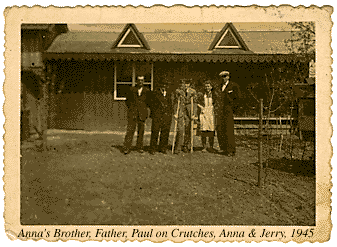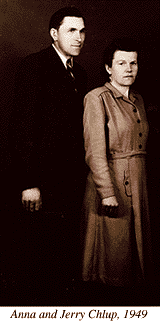ANNA AND JERRY CHLUP TELL THEIR STORY (Conclusion)


Paul got better pretty fast. At first he couldn't do anything; he was very weak, and underweight. Then when he could walk again, he worked in our store. He and Jerry became almost like brothers. Paul was quiet; he never drank or smoked. He was good company. We talked a lot. You know what he always thought? That I had Jewish parents!
"Panni, (he called me Panni--it means Mrs.) your parents are Jewish," he would say.
"Why?"
"Because you are like a Jew." He meant because I liked business, like my father. Paul was a businessman.
We never asked him if he was a Jew or not, and he never talked about it. Maybe he was afraid. We never thought about it. He had told us he was Polish, that's all. After he had been with us about a year, he decided to go back to Poland to see if anyone in his family had survived. When he found out that everyone had died he came back to live with us. About two or three weeks after he returned he got a letter from a Jewish organization telling him that because he didn't return to Poland his business had been confiscated. He cried when he got this letter.
"Paul, why are you crying?" we asked. "For your business? You should be happy that you are alive. You can always make more money."
"Oh, Panni, it's not about the business. I am crying because I received this letter from the Jewish Committee--because I didn't tell you I am a Jew."
I said to him, "So what?"
We always helped somebody. Sometimes people are good to us, and remember, and sometimes they forget. Paul never forgot us. We are country people--simple people. Maybe if people our age had everything and never suffered, maybe they wouldn't do what we did. No, we didn't suffer either, but we were never rich. We are glad, of course, that we could save him, and that he could enjoy life, because so many died when they came back--like my nephew.
When I go back to Czechoslovakia and see our old house again, I always think about Paul running across the fields, and the S.S. and Gestapo looking for him. I remember a lot. I was afraid then. Of course.

In 1949 Jerry made some derogatory remarks in public about the local Communist regime. In short order the Chlups found the door to their grocery store locked, and Jerry under arrest. The sentence would have been hard labor in the uranium mines. Between Jerry's two trials Anna arranged for them to make an abrupt escape one night, with no baggage, across the border to Germany. They expected to spend about six months there, waiting for the Communists to be ousted from power in Czechoslovakia. Eighteen months later, still living in a German camp for displaced persons, they despaired of ever returning to their native country, and applied for Canadian visas. They eventually settled in San Francisco, where Anna lives today. Jerry died in the spring of 1988, at the age of 77.
Jerry and Anna Chlup gave this interview in their San Francisco home in 1987.